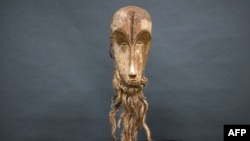The couple, in their eighties, sold the wooden mask in September 2021 as part of a number of antiquities including African artifacts they had kept in their secondary home in southern France and wanted to be rid of.
The objects had belonged to an ancestor who was a governor in Africa, and were believed to be of little value. Apart from the mask, they also included lances, a circumcision knife, a bellows and musical instruments.
Auctioneers described the mask as "an extremely rare 19th-century mask, property of a secret society of the Fang people in Gabon," an ethnic Bantu group, with only around 10 such objects still in existence.
The couple let the mask go for 150 euros ($165), but in March 2022 it was sold to an unidentified buyer at an auction in the southern city of Montpellier, fetching 4.2 million euros ($4.6 million).
The couple promptly filed for an injunction to cancel the original sale, arguing there had been an "authentication error." They also said the mask's buyer "was aware of the mask's real value" at the time of the purchase.
But the court rejected the request, saying the couple had failed to make any attempt to get the mask valued before selling.
Their claim was characterized by "inexcusable negligence and frivolity," the court said, ruling that they were not owed any money.
It also ruled that the antiquities dealer, who himself was no expert on African art, did not cheat them.
The dealer actually offered to pay them 300,000 euros (around $330,000), the auction starting price, but the couple's children refused, preferring to take the matter to court.
The couple's lawyer, Frederic Mansat-Jaffre, said after the verdict that his clients were "dumbstruck" by the decision and considering an appeal.

Forum